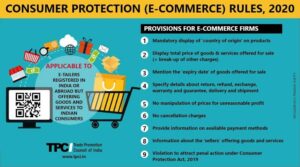Everyone would have heard the story of a person receiving toy in place of the high end smartphone which s/he had ordered from an e- commerce platform? While this is just one instance, there are many cases which had forced the Ministry of Consumer Affairs, Food, and Public Distribution in India to make certain rules and assure consumer rights in case of fraud.
Background
The Consumer Protection (E-Commerce) Rules, 2020 established a comprehensive framework for overseeing the online business environment, primarily with regard to consumer protection. In an effort to safeguard customers’ rights and interests in the online market, it is an essential first step toward regulating the e-commerce sector. A wide range of provisions are covered by these regulations, including those that deal with data protection, transparency, product quality, and dispute resolution. They strive to ensure that e-commerce platforms respect morality, responsibility, and fairness while providing easy channels for users to file grievances.
Key Features
 In order to control and safeguard customers in the e-commerce industry, the Ministry of Consumer Affairs, Food, and Public Distribution in India introduced the Consumer Protection (E-commerce) Rules, 2020. These regulations provide a foundation for just practices and openness in internet transactions. Some key highlights include:
In order to control and safeguard customers in the e-commerce industry, the Ministry of Consumer Affairs, Food, and Public Distribution in India introduced the Consumer Protection (E-commerce) Rules, 2020. These regulations provide a foundation for just practices and openness in internet transactions. Some key highlights include:
- Product Information: It is required of e-commerce platforms to give thorough product information, such as information on the country of origin, seller data, and return guidelines.
- Grievance Redressal: In order to rapidly handle customer concerns, e-commerce companies must set up effective grievance redressal procedures.
- Counterfeit Products: To improve consumer protection, the regulations place stronger accountability on e-commerce sites that offer deceptive or fake goods.
- Unfair Trade Practices: Under these rules, it is illegal to engage in unfairly influencing product prices or in misleading advertising.
- Data Protection: Preserving customer data and guaranteeing its security and privacy throughout online transactions are priorities.
- Transparency: Online retailers must guarantee that product descriptions are accurate and offer explicit terms and conditions, including rules about returns and refunds.
Impact
E-commerce is a sector of the economy that is growing quickly. In India, the retail sector is primarily unorganized. Since 2021, e-commerce holds a 3% portion of the retail market, while organized retail, or traditional storefronts hold 10%. The benefits of e-commerce include:
(i) More options for consumers
(ii) Making it easier for new companies to enter the market by promoting easier online customer discovery
(iii) Improvements in the productivity and competitiveness of the industry.
The 2020 Rules and the proposed changes contain criteria specific to e-commerce companies that differ from those of similar physical retail enterprises. Among these are requests for a grievance process, the designation of particular people to oversee adherence, and restrictions on affiliated companies and related parties.
Way Forward
It is predicted that the Consumer Protection E-Commerce Rules, 2020 would have enhanced enforcement strategies and stricter regulations. In the next years, we should anticipate the following:
- A Greater Emphasis on Data Privacy: Given the increasing importance of data in e-commerce transactions, data privacy and protection may receive more attention.
- Transparency and Fair Practises: The e-commerce industry must uphold stringent transparency and fair business standards in order to ensure that customers have access to accurate pricing, product information, and clear terms of service. E-commerce platforms should provide users with clear terms and conditions, thorough product descriptions, and information about any additional fees or prices. This helps to build online shoppers’ trust and confidence by ensuring that they can make informed decisions when making purchases.
- Prevention of Counterfeit Products: Stricter laws may be implemented to prevent the sale of counterfeit or subpar goods in order to safeguard consumer interests.
- Consumer Redressal Mechanisms: When laws change, consumers might have access to online dispute platforms or other more effective ways for addressing grievances.
- Cross-Border Transactions: As international trade grows, regulations may be developed to address issues including import duties and fines.
- Sustainability and Ethical Practices: E-commerce platforms should be required to adhere to ethical and sustainable practices while sourcing, manufacturing, and delivering products as part of their consumer protection policies.
Future developments in consumer protection legislation pertaining to e-commerce are expected to be influenced by a number of factors, including customer expectations, the advancement of new technologies, and the need to strike a balance between innovation, promotion and consumer welfare protection. These regulations will most likely alter to reflect the challenges and the evolution of online shopping.




















